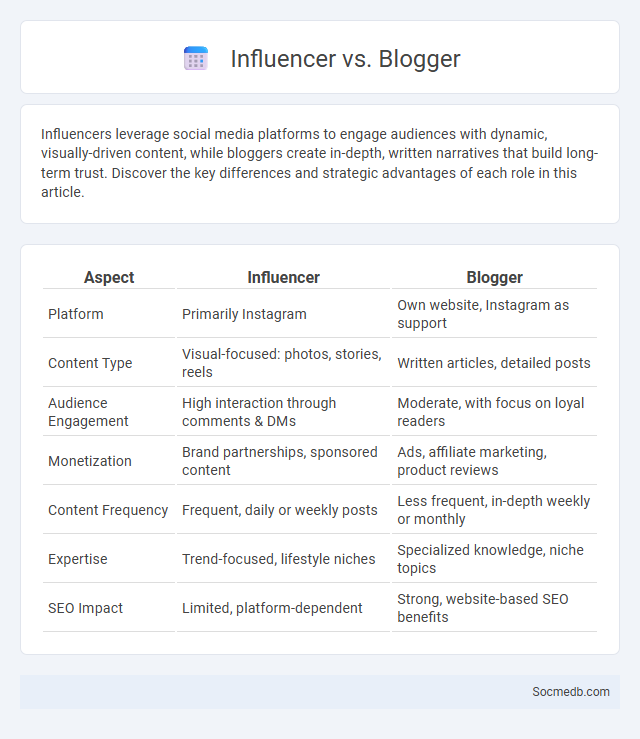
Photo illustration: Influencer vs Blogger
Influencers leverage social media platforms to engage audiences with dynamic, visually-driven content, while bloggers create in-depth, written narratives that build long-term trust. Discover the key differences and strategic advantages of each role in this article.
Table of Comparison
| Aspect | Influencer | Blogger |
|---|---|---|
| Platform | Primarily Instagram | Own website, Instagram as support |
| Content Type | Visual-focused: photos, stories, reels | Written articles, detailed posts |
| Audience Engagement | High interaction through comments & DMs | Moderate, with focus on loyal readers |
| Monetization | Brand partnerships, sponsored content | Ads, affiliate marketing, product reviews |
| Content Frequency | Frequent, daily or weekly posts | Less frequent, in-depth weekly or monthly |
| Expertise | Trend-focused, lifestyle niches | Specialized knowledge, niche topics |
| SEO Impact | Limited, platform-dependent | Strong, website-based SEO benefits |
Understanding Influencers and Bloggers: Key Definitions
Influencers and bloggers play a pivotal role in social media marketing by shaping consumer behavior through authentic content and targeted engagement. Influencers leverage their large, loyal followings on platforms like Instagram and TikTok to promote brands, while bloggers create in-depth, niche-specific articles fostering trust and long-term audience relationships. Understanding the distinctions between micro-influencers, macro-influencers, and content creators is essential for optimizing influencer partnerships and maximizing brand visibility.
The Evolution of Digital Personalities
The evolution of digital personalities has transformed how you express identity and interact online, blending authenticity with curated personas across platforms like Instagram, TikTok, and LinkedIn. Algorithms and AI-driven content personalization continuously shape your digital footprint, influencing visibility and engagement. Emerging trends in virtual influencers and augmented reality experiences further redefine personal branding and social connectivity in the social media landscape.
Influencer vs Blogger: Core Differences
Influencers leverage their large social media followings to promote brands through authentic engagement and real-time content, while bloggers primarily create long-form, detailed posts on specific topics hosted on personal websites. Influencers excel in visual platforms like Instagram and TikTok, prioritizing short, impactful videos and stories, whereas bloggers rely on SEO-optimized articles to drive organic traffic and establish authority. The core difference lies in content format and audience interaction: influencers influence trends through immediacy and personality, while bloggers provide in-depth information and sustained readership.
Content Creation Methods: Blogging vs Influencing
Content creation on social media revolves around blogging and influencing, two distinct yet overlapping methods that shape audience engagement and brand growth. Blogging offers in-depth, structured content focused on expertise and SEO optimization, drawing users through detailed articles and evergreen posts. Influencing leverages personal branding, visual storytelling, and real-time interactions to foster trust and immediate connections with followers across platforms like Instagram, TikTok, and YouTube.
Platform Usage: Where Influencers and Bloggers Thrive
Social media platforms such as Instagram, TikTok, and YouTube serve as primary hubs where influencers and bloggers engage millions of followers through visually-driven content and authentic storytelling. Instagram's visual appeal fosters brand collaborations and lifestyle showcasing, while TikTok's algorithm promotes rapid follower growth through short viral videos. YouTube remains essential for long-form content creation, offering monetization opportunities through ads and sponsorships, making these platforms critical for influencer marketing strategies.
Audience Engagement: Trust and Interaction
Building trust through authentic content significantly enhances audience engagement on social media platforms. Interactions such as timely responses, personalized comments, and community-driven discussions foster a loyal and active follower base. High engagement metrics, including shares, likes, and meaningful conversations, directly correlate with increased brand credibility and sustained user interest.
Monetization Strategies for Influencers and Bloggers
Influencers and bloggers leverage sponsored posts, affiliate marketing, and brand collaborations as primary monetization strategies on social media platforms. Leveraging platforms like Instagram, YouTube, and TikTok, they maximize earnings through ad revenue sharing programs and exclusive content subscriptions via Patreon or OnlyFans. Optimizing audience engagement and niche targeting enhances partnership opportunities and boosts overall revenue streams.
Brand Collaborations: What Brands Look For
Brands seek authentic engagement, high follower quality, and content alignment in social media collaborations to maximize impact. Your audience demographics, niche relevance, and past partnership performance significantly influence brand interest. Consistent, creative, and genuine communication ensures long-term brand relationships and mutual growth.
Measuring Success: Metrics and Analytics
Measuring success on social media relies heavily on key metrics such as engagement rate, reach, impressions, and conversion rates, which provide insight into audience interaction and content effectiveness. Analytics tools like Google Analytics, Facebook Insights, and Instagram Analytics help track these metrics in real-time, enabling data-driven decision-making to optimize campaigns. Understanding metrics like click-through rates (CTR) and follower growth also allows businesses to refine strategies for improved brand visibility and ROI.
Choosing the Right Path: Blogger or Influencer?
Selecting the right path between becoming a blogger or an influencer depends on your content style, audience interaction, and monetization goals. Bloggers typically focus on long-form, in-depth content optimized for SEO, driving organic traffic through detailed articles and niche expertise. Influencers prioritize visual storytelling and engagement across platforms like Instagram and TikTok, leveraging brand partnerships and sponsored content for revenue.
 socmedb.com
socmedb.com